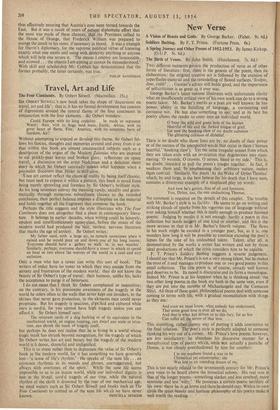Travel, Art and Life
The Four Continents. By Osbert Sitwell. (Macmillan. 25s.) SIR OSBERT SITWELL'S new book takes the shape of `discursions on travel, art and life'; that is, it has no formal development but consists of digressions around the central theme of the four continents in conjunction with the four elements. Sir Osbert wonders: Could Europe with its long coastline ... be made to represent Water; Asia, with its huge land mass, Earth; Africa, with its great heart of flame, Fire; America, with its countries born of freedom, Air?
Without attempting to expand or develop this theme, Sir Osbert fol- lows his fancies, thoughts and memories around and away from it so that within this book are almost unconnected subjects such as a description of the orgies of the Moslem Zaiouias who are inspired to eat prickly-pear leaves and broken glass; reflections on space travel; a discussion on the artist Nadclman and a delicious short story in which Sir Osbert satirically relates what happens when a journalist discovers that Hitler is still alive.
Since art cannot reflect the chaos of reality by being itself chaotic, but must seek to express it within a pattern, this book is saved from being merely sprawling and formless by Sir Osbert's brilliant style. As his long sentences convey the meaning surely, steadily and gram- matically through numerous subordinate clauses to the rounded conclusion, their perfect balance imposes a discipline on the material and holds together all the fragments that compose the book.
Perhaps the title suggests and the style illustrates why The Four Continents does not altogether find a place in contemporary litera- ture. It belongs to earlier decades, when writing could be leisurely, opulent and unselfconiciously upper-class, before the strain of the modern world had produced the taut, restless, nervous literature that marks the age of anxiety. Sir Osbert writes,:
My father used, with a large air, to remark sometimes when it rained and he would pace up and down one of his long rooms: 'Everyone should have a gallery to walk in, in wet weather.' Similarly, perhaps, everyone should have a tower in which to spend an hour or two above the worries of the world in a cool and airy seclusion.
Only a man who has a tower can write this sort of book. The writers of today have no tower to which they may escape from the anxiety and frustration of the modern world; they do not know the beauty of Sir Osbert's type of travel; their humour, unlike his, lacks the acceptance to purge it of bitterness.
I do not mean that I think Sir Osbert complacent or insensitive;
on the contrary, in his passionate awarenessfof the tragedy in the world he refers often to the walls that never kept out invaders, to the shrines that never gave protection, to the elements men could never propitiate. But his tragedy is spacious, dignified and cultured while ours is sordid, for you cannot have high tragedy unless you can afford it. Sir Osbert himself says: The reiterant rattle of a dog barking or of its equivalent in the mechanical world, an engine running, can dwarf any scale or situa-. tion, can shrink the mask of tragedy itself, but perhaps he, does not realise that he is living in a world whose tragic mask has shrunk beyond recognition, for the tragedy of which Sir Osbert writes has art and beauty but the tragedy/of the modern ,world is hideous, shameful and undignified.
This is to stress rather than to depreciate the value of Sir Osbert's book in The modern world, for it has something we have generally lost—`a sense of life's rhythm.' He speaks of 'the sane life ... an existence rhythmic in its moods and phases, unexaggerated, but afways with overtones of the spirit.' While the sane life seems impossible to us in an insane world, while our individual dignity is lost in the brutal, sordid tragedy of our time, while the natural rhythm of the etuith is drowned by tip roar of our mechanical age, we need writers such as Sir Osbert Sitwell and books such as The Four Continents to remind us of the lane life wh:ch we have never


































 Previous page
Previous page